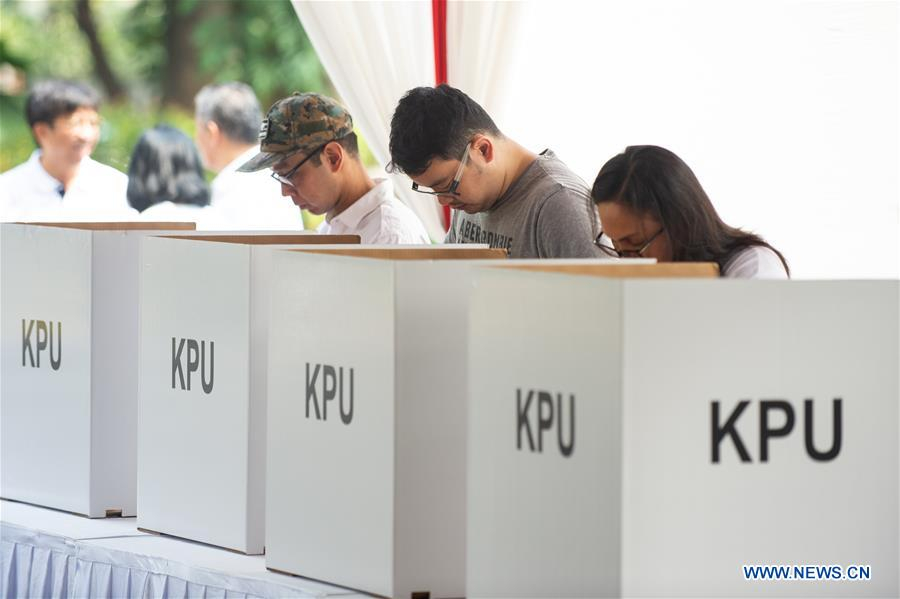
Opinion
16:56, 17-Apr-2019
Indonesian election: Will Indonesia re-elect Widodo?
Irine Hiraswari Gayatri

Editor's note: Irine Hiraswari Gayatri is a researcher at Centre for Political Studies of the Indonesian Institute of Sciences in Jakarta. The article reflects the author's opinion, and not necessarily the views of CGTN.
About 192 million voters across 34 provinces are expected to cast their ballot for the president and vice president on April 17, along with their vote for members of local, regional and national parliaments.
In the beginning, skepticism has been soared on the election which is linked to the domestic political condition. Hoaxes spread which tends to direct mostly towards Joko Widodo who runs for the second term in office.
The Komisi Pemilihan Umum (KPU), the general election committee, as the organizer is claimed by some to show incapacity to manage election processes abroad because of shortages in technicalities and procedures which made voters were unable to vote abroad and, indeed, sparked tensions. Cases emerged among others in Malaysia, Sydney and Hong Kong.
However, amidst persistent negative tones toward the incumbent Joko Widodo who has businessman background, the KPU has stated that it has been under constant attacks since late 2018. Several hoaxes were distributed to highlight the impression that KPU is incapable; whereas the opposition groups that support the contenders claimed or insinuated that the 2019 election would significantly color with fraud.
The government, on the other hand, mentioned that it would guarantee that election will be conducted democratically, securely and peacefully as security apparatuses are ready to be deployed in strategic locations to deter any possibility of disturbances.

Prabowo Subianto (R), gestures as Joko Widodo listens during a second presidential debate in Jakarta, February 17, 2019. / VCG Photo
Prabowo Subianto (R), gestures as Joko Widodo listens during a second presidential debate in Jakarta, February 17, 2019. / VCG Photo
Evaluating Past Work
Apart from that illustration, how electable is Joko Widodo? Will he become the 8th Indonesia's President? One indicator is the economic stability, which is logical since any elected leader is hoped to bring wealth towards the people who have chosen him or her.
The analyst gives mixed responses to his performances during this first four years of leadership. Nikkei stated that Indonesia had benefitted a steady economic development for the period of Joko Widodo's near-five years in office, with actual gross domestic product growing around five percent. From 2015 to 2018, the economy was only able to grow by 4.88 percent, 5.03 percent, 5.07 percent and the highest of 5.17 percent in 2018.
Nevertheless, the increase is below the seven percent that he promised during his 2014 election campaign. According to economic analyst Agustinus Prasetyantoko, as quoted in Kompas, February 7, 2019, this is mostly due to many factors, among others the worsening of global economic factors. Such a situation has affected the financial condition of many nations not merely Indonesia.
Another factor is the escalation of the trade war between the U.S. and China which has influenced the trade partners of the two countries. Putting these two factors at hand, one can only be optimistic that Indonesia's 2018 economic growth reached 5.17 percent in 2018.
However, the government is trying to do its best to fulfill the wealth of the people, commencing infrastructure projects to narrow the gap between rich and poor, which in general are appreciated widely.

Voters cast their votes at a polling station in Jakarta, Indonesia, April 17, 2019. /Xinhua Photo
Voters cast their votes at a polling station in Jakarta, Indonesia, April 17, 2019. /Xinhua Photo
Future Projection
Another positive tone on Joko Widodo's electability came from Roy Morgan survey on April 3, 2019, positioning support for him at 56.6 percent. This number is not surprising as many Indonesia pollsters announced similar digits. Under his presidency, Sino-Indonesian relations have reached a new stage where leaders of the two countries have exchanged high-level visits.
Despite the history and frequent dynamics of domestic politics, the bilateral relations are quite stable. Bilateral ties started in 2005 under then Indonesian President Susilo Bambang Yudhoyono's signing of strategic partnership, which continued as a comprehensive partnership in 2013.
At present, Indonesia and China share a similar interest in trade issues. Such a situation is proven with China as the third largest investor in Indonesia, after Japan and Singapore, respectively, in 2016.
The move of China to enhance trade agreements is not only with Indonesia but also with other ASEAN member states, especially under the BRI scheme, which embraces globalization as a global player.
China needs to fulfill its sources for domestic needs, and it cannot do so without developing good relations with neighbor countries. Mutually beneficial ties are then quite logic, especially with Indonesia as an essential factor in the region.
This strategy resonates well under Indonesia's maritime fulcrum under the current Indonesian President, while at the same time maintaining its free and active foreign policy. If Joko Widodo were to be re-elected, Beijing and Jakarta should probably maintain good relations as long as both can deal with hindrances over investment promises via dialogue.
Also, negative impacts that originated from false flags about Chinese foreign workers required humanistic approaches, for instance through people to people diplomacy to deepen mutual understanding.
(If you want to contribute and have specific expertise, please contact us at opinions@cgtn.com.)

SITEMAP
Copyright © 2018 CGTN. Beijing ICP prepared NO.16065310-3
Copyright © 2018 CGTN. Beijing ICP prepared NO.16065310-3